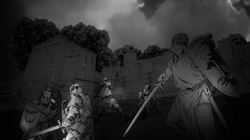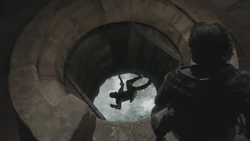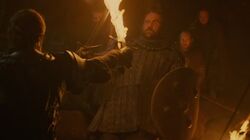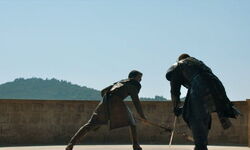- "A trial by combat, deciding a man's guilt or innocence in the eyes of the gods by having two other men hack each other to pieces. Tells you something about the gods."
- ―Tyrion Lannister
A trial by combat is a means by which a party can prove their innocence when accused of a crime in the Seven Kingdoms. In lieu of a standard trial where a lord - or a council of them - hears testimony from the involved parties and makes a ruling, one or all parties may choose the option of a trial by combat.
Rules
Only highborn noblemen have the right to request a trial by combat: smallfolk do not possess this right. Noblewomen apparently also have the right to request a trial by combat but are not expected to fight themselves.
If a highborn is accused of a crime, at any point during the trial held by the local lord he can demand his right to a trial by combat. This right is held to be so inviolable that even a lord that is fully convinced that the accused should die would be hesitant to simply deny such a request (if it is made in public, at least). Even members of the royal family or high officials such as the Hand of the King would feel incapable of denying the request if it was made publicly.
In a trial by combat the accused may represent themselves in combat or, if unable (such as if they are female, injured, crippled, a dwarf, or otherwise incapacitated), may ask for a champion to represent them. The presiding lord may, at least, demand that they pick a champion from currently available warriors, i.e. instead of allowing them to name a champion currently located on the far side of Westeros, attempting to try to delay the trial by weeks.
A trial by combat does not, necessarily, need to be fought to the death. It is fought until one man yields - though if the accused is representing himself he would fight to the death to avoid a certain execution, and even the champion of an accused man will often fight to the death due to potential reward from the accused if he wins. The fight can also end if the accuser withdraws the accusation, or the accused confesses.
The victorious party is held to have had his or her case judged fairly by the gods (be it the Seven, the Old Gods of the Forest, or whatever they worship) and has proven their innocence in the eyes of the gods. Hence, if the accused party is victorious, they are cleared of all charges. If the accused or their champion is defeated, however, then they are considered guilty and condemned to death. While in theory the gods will favor the righteous party, most often the winner tends to simply be the strongest, the quickest, or just the luckiest.
Trial of seven

The trial by seven of Ser Duncan the Tall.
Very rarely, after the accused has demanded a trial by combat, he may also demand a "trial by seven": instead of one man versus one man, two teams of seven men each will fight. As with a normal trial by combat, the accused and accuser each have to pick six other champions - though each also has the option to not fight in person but to name a seventh man as their personal champion. A trial by seven ends only when all seven men on one side have been defeated (either by yielding or dying).
Notable trials by combat
In the Game of Thrones TV series:
- First Trial by Combat of Tyrion Lannister
- Trial by Combat of Sandor Clegane
- Second Trial by Combat of Tyrion Lannister
Historical trials by combat:
- Trial by Seven of Duncan the Tall
History
Season 1

Bronn defeats Ser Vardis Egen in trial by combat.
After Tyrion Lannister is arrested by Catelyn Stark and imprisoned in The Vale of Arryn for the (false) accusation of attempting to murder Bran Stark, he demands a trial by combat, knowing that Lord Robin Arryn will have him thrown through the Moon Door for his own amusement, whether or not he is guilty. As neither Robin nor Lysa Arryn can fight, they name Ser Vardis Egen, the Captain of the Guards of the Eyrie, as their champion. Tyrion names his brother Jaime as his champion, but Lysa refuses to wait for him. The sellsword Bronn volunteers to fight for Tyrion instead. Vardis dons full armor and a shield to fight Bronn, who maintains his speed and tires Vardis out quickly, ultimately stabbing Vardis fatally and pushing his body through the Moon Door, thus proving Tyrion's innocence in the eyes of the Gods.[1]
Season 3

Lord Beric Dondarrion and Sandor Clegane in trial by combat.
During her captivity with the Brotherhood Without Banners, Arya Stark accuses Sandor Clegane for the death of her friend Mycah. As the Hound argues he was following the orders of Prince Joffrey Baratheon and there are no other witnesses, Lord Beric Dondarrion sentences the deserter Kingsguard to trial by combat.[2]
The trial takes place within the caves of Hollow Hill. Lord Beric uses his own blood to ignite his sword for his duel with the Hound. Clegane is initially at a disadvantage due to his fear of fire, disturbed by the flaming sword and the torches in the chamber. Dondarrion manages to set the Hound's shield on fire, but Clegane eventually overpowers the outlaw lord and kills him, bringing his blade down through Beric's shoulder. Even though Thoros resurrects his fallen comrade, the Hound is found innocent before the eyes of the Lord of Light and allowed to go.[3]
Season 4

Prince Oberyn Martell and Gregor Clegane in trial by combat.
Considering his trial for the murder of Joffrey Baratheon to be a farce, and refusing to go along with his father's plans, Tyrion Lannister demands a trial by combat to defend his innocence.[4] Queen Cersei chooses Ser Gregor Clegane as her champion. Tyrion has difficulty finding a champion; his brother Jaime cannot fight well enough with his left hand, while Bronn is unwilling to face Clegane. However, Oberyn Martell then volunteers to stand as champion for Tyrion to get a chance to kill the Mountain as revenge for the rape and murder of his sister Elia and her children during the Sack of King's Landing.[5]
During the trial, Oberyn Martell fights with a spear and little armor while Gregor Clegane is covered in heavy plate armor and wields a greatsword. Oberyn uses his speed and the long reach of his spear to gain the upper hand against Gregor. He wounds Clegane and knocks him on his back. However, Oberyn is obsessed with extracting a confession from Gregor and he lets his guard down, and is tripped by Gregor. Gregor roars for all to hear that he raped and killed Elia as he smashes out Oberyn's teeth and gouges his eyes out, before crushing Oberyn's skull between his fists and collapsing next to his dead opponent. Thus, Tyrion is found guilty and sentenced to death[6]. Before his sentence can be carried out, however, Tyrion murders his father and manages to escape King's Landing for Essos.[7]
Season 6
Under the influence of the High Sparrow, King Tommen Baratheon discontinues trials by combat, deciding that they are barbaric and an easy way for people of influence and power to evade justice. In doing so, he robs his mother, Cersei Lannister, of her best chance to escape any sort of punishment from the courts as she can no longer play her trump card by using Gregor Clegane as her champion.[8] This decision is likely overturned after the High Sparrow is overthrown and Tommen commits suicide, allowing Cersei to assume the throne.[9]
In the North, Jon Snow offers Ramsay Bolton a de facto trial by combat between the two of them to settle their dispute over Winterfell. Ramsay initially refuses, knowing that Jon could probably beat him, as he had heard that he's the greatest swordsman in the North, but later agrees after Jon and his allies breach Winterfell, choosing a bow and arrow as his weapon. Jon blocks all of Ramsay's arrows with a shield until he gets close enough to subdue Ramsay.[10]
Quotes
- "I will not give my life for Joffrey's murder, and I know I'll get no justice here, so I will let the gods decide my fate! I demand a trial by combat!"
- ―Tyrion Lannister
- Ellaria Sand: "Your brother was murdered, and you sit here in the Water Gardens, staring at the sky and doing nothing?"
- Doran Martell: "Oberyn was slain during a trial by combat. By law, that is no murder."
- — Ellaria Sand and Doran Martell on the death of Oberyn Martell.[src]
In the books
In the A Song of Ice and Fire novels, trials by combat are risky gambits only invoked when there is little other choice. In historical times there were more variations of the trial, such as a trial of seven when the two sides would pick seven champions who would fight until one side yielded or the plaintiff withdrew their charge. This was held to be a more holy contest, but the practical difficulties have made such trials rare. Ser Duncan the Tall first came to the attention of legend by holding a trial of seven against his accuser, Prince Aerion Targaryen, and defeating him and his other six.
For trials by combat involving the royal family, they must be defended by a knight of the Kingsguard. After her arrest, Cersei is left despondent, as the Kettlebacks have also been arrested and Meryn Trant is not a particularly good swordsman, though her hopes are lifted when Qyburn presents her with Ser Robert Strong, a new Kingsguard.
A trial by seven is exceedingly rare, particularly in recent generations, when they only seem to have happened every century or so. Such trials are rare because they are very dangerous. The trial by seven of Ser Duncan the Tall (90 years before the events of Game of Thrones) was said to be the first held in a century - and there may not have been another trial by seven held in the nearly a century that passed afterwards. King Maegor the Cruel also engaged in a trial of seven against the champions of the Faith Militant, about a century and a half before Ser Duncan's trial.
See Also
Trial by combat on A Wiki of Ice and Fire
Trial of seven on A Wiki of Ice and Fire
Law and justice on A Wiki of Ice and Fire
Trial by combat on Wikipedia
References
- ↑ "A Golden Crown"
- ↑ "And Now His Watch is Ended"
- ↑ "Kissed by Fire"
- ↑ "The Laws of Gods and Men"
- ↑ "Mockingbird"
- ↑ "The Mountain and the Viper"
- ↑ "The Children"
- ↑ "No One"
- ↑ "The Winds of Winter"
- ↑ "Battle of the Bastards (episode)"
